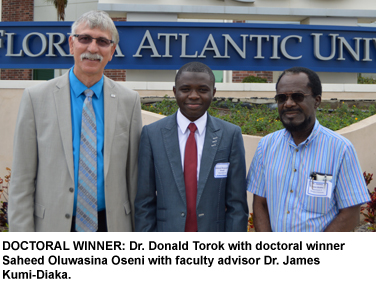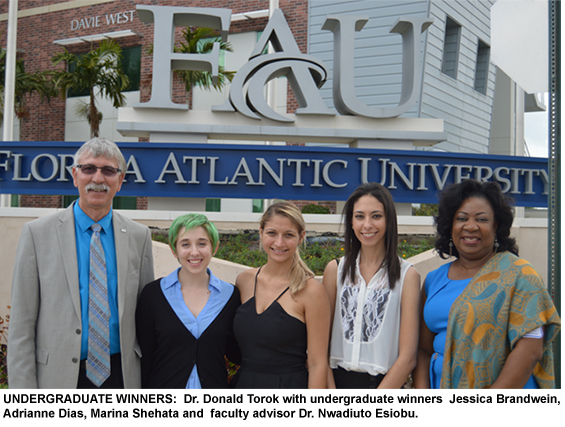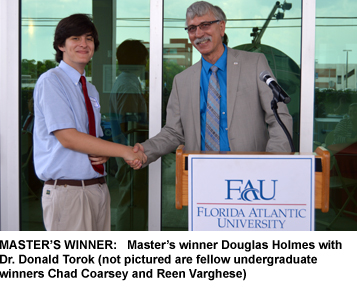6th Annual Broward Student Research Symposium

FAU Broward students Saheed Oluwasina Oseni, Douglas Holmes, Chad Coarsey, Reen Varghese, Jessica Brandwein, Marina Shehata and Adrianne Dias emerged as the big winners in the Sixth Annual Broward Student Research Symposium held Friday, March 18, 2016 at the FAU Davie campus.
The annual student research symposium provides researchers in the categories of doctoral, masters and undergraduate to present their projects and the selection of the best in its class by a panel of judges comprised of faculty.
Over 50 students, guided by their faculty advisors, participated this year.
"Since FAU has made undergraduate research part of the strategic plan, there has been a significant increase in the number of faculty members that are mentoring student research projects. Along with this greater mentoring activity, the number and quality of the research projects across all levels continues to rise,” said Dr. Donald Torok, Associate Dean, College of Education, Broward Campuses, who also served as the emcee and host of the event. “The confidence and knowledge that the students exhibit is a true reflection of how this mentored research activity helps to build better graduates.”

In the doctoral category, Saheed Oluwasina Oseni, a doctoral student in the Charles E. Schmidt College of Science, Department of Biological Sciences won for his project: Dietary Phytonutrients Inhibit Redox Reprogramming in Radioresistant Metastatic Prostate Cancer Cells. His faculty mentor is Dr. James Kumi-Diaka.
"Cancer cells are so smart that they continue to evolve different defense mechanisms against attacks. If we want to defeat cancer, we must understand how and why cancer cells behave the way they behave,” said Saheed Oluwasina Oseni. "My research will help to understand why some prostate cancer cells reprogram their redox system to become radioresistant and how dietary compounds in foods can prevent or aggravate redox reprogramming. I plan to develop molecular markers for redox reprogramming detection and publish my findings in reputable journals to create awareness on the dangers of unhealthy dietary habits."
In the master’s category, Douglas Holmes, Chad Coarsey, and Reen Varghese, Graduate Students in the Charles E. Schmidt College of Science, Department of Biological Sciences, Microbial Biotechnology Lab and Micro and Nanotechnologies for Medicine, Department of Computer & Electrical Engineering and Computer Science, won for their project: Creation and Authentication of a Safe Ebola Virus Surrogate Using Synthetic Biology. Their faculty mentor is Dr. Nwadiuto Esiobu.
"Deadly pathogens like Ebola virus can only be studied in very specialized labs, of which there are only a handful in the world. This limits the number of scientists that can effectively work towards a cure for, or even detection of, these diseases,’ said Douglas Holmes. "If we can build a surrogate for the genetic information of these pathogens that doesn't pose a risk to public health and safety, we can greatly expand the number of researchers capable of working to cure humanity's most dangerous diseases. My work will revolve around detecting an Ebola surrogate that is inside cells, but this technique could apply to about any pathogen."
In the undergraduate category, Jessica Brandwein, Marina Shehata and Adrianne Dias, Undergraduate Students in the Charles E. Schmidt College of Sciences, Department of Biological Sciences won for their project, Community Structure of the Human Skin Microbiome and Evaluation of its Forensic Match to Bacteria from Personal Mobile Devices. Their faculty mentor is Dr. Nwadiuto Esiobu.

"The goal of our project is to obtain, sequence, and compare bacterial DNA samples from the skin and cell phones of volunteers in order to evaluate the reliability of the human skin microbiome in forensic identification, “ said Jessica Brandwein. "We will attempt to match each phone to its owner using only the microbial populations found, as a person's skin microbiome is known to be extremely diverse and unique. Our samples have been sequenced, so our next step is to perform statistical analysis in order to determine the success rate of matching an individual to something they have touched using the skin microbiome. This method can be compared to existing methods of identification, such as fingerprinting, and – after further experiments are conducted on a larger scale – widely applied to the field of forensics. Our results will also contribute to our understanding of the community structure of the human skin microbiome, as only a very small fragment of it has been cultured or sequenced. We hope to have a detailed paper published during the summer.”
FAU Broward Associate Provost Anthony Abbate praised all of the participants and said: “The very high quality of the graduate and undergraduate research projects presented here by our Broward students contributes to the measures that place FAU as number one in the performance rankings of state universities.”
